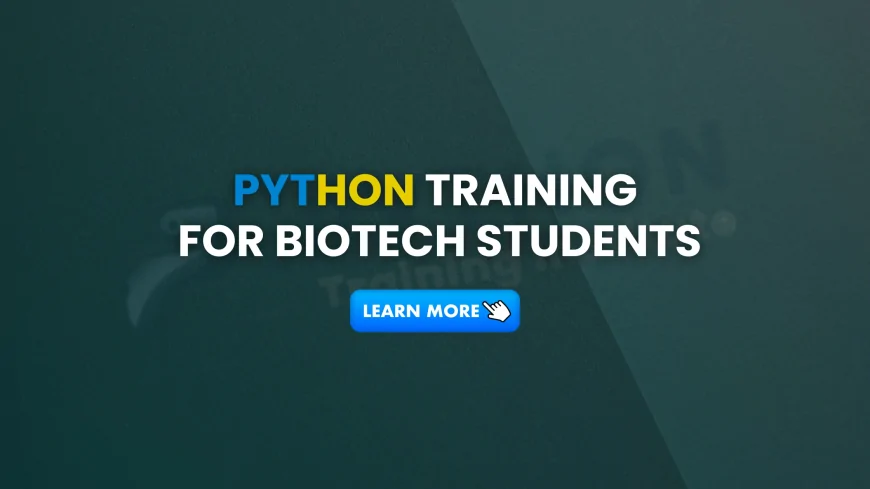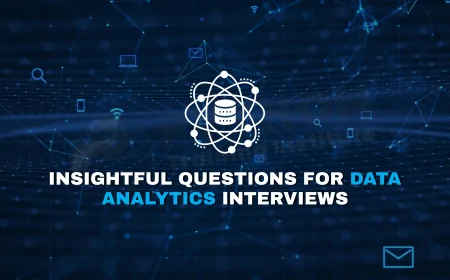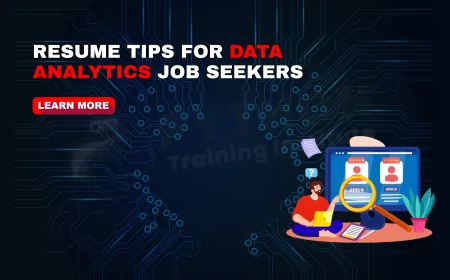Specialized Python Training for Biotech Students Pune | Python for Biotech: Specialized Training Programs in Pune
Explore specialized Python training for biotech students in Pune. Learn how to apply Python in bioinformatics, genomics, and biotech research. Ideal for students and professionals in life sciences.

1. Overview
Pune—a hub of biotech institutes like IBB and Infotech—is embracing Python as a key skill for life sciences. Specialized training programs bridge biology and programming, equipping students to analyze genomic data, automate lab workflows, and craft bioinformatics pipelines in weeks.
2. Why Python for Biotech?
- Readable & concise: Python's syntax suits biological analysis better than verbose languages. :contentReference[oaicite:0]{index=0}
- Rich libraries: Biopython, Pandas, NumPy support sequence processing and statistical workflows.
- Automation: Lab automation (e.g. generating primers, controlling instruments) is feasible via Python.
- Community & research: Pune’s biotech community often uses Python in academia and industry.
3. Key Learning Outcomes
After training, learners can:
- Write Python scripts for parsing FASTA/FASTQ files
- Visualize sequence alignments and differences
- Automate data-processing of PCR/qPCR results
- Build simple bioinformatics pipelines
- Integrate Python with molecular biology tools like BLAST
- Prepare reports with plots and analysis summaries
4. Delivery Formats Available
Common formats in Pune:
- Classroom workshops (e.g., IBB or Besant Technologies): face-to-face training focused on bioscience use cases.
- Live online courses (e.g., Besant Python with biotech modules): interactive sessions with labs. :contentReference[oaicite:1]{index=1}
- Semi‑online hybrid: weekend meetups plus self-study; ideal for students.
5. Top Institutes in Pune
Webasha Technologies – Specialized Python Training for Biotech Students (Pune)
- Mode : Classroom & Live Online—led by instructors with both Python and biotech domain expertise
- Scope : Core Python → BioPython library → Genomic data analysis → NGS data processing → Data visualization with Matplotlib & Seaborn → Real-world biotech mini-projects (sequence alignment, protein structure parsing)
- Certification : Webasha Technologies Biotech-Python Specialist Certificate
- Placement : 85 % placement track record • 400+ interviews arranged with bio-informatics startups & research labs • dedicated resume feedback & mock-interview prep
- Duration & Fee :~40 hours total • INR 20,000–30,000
6. Typical Curriculum
- Basics: Python, data structures, file handling
- Bio-data parsing: FASTA/GenBank using Biopython
- Data analysis: Pandas, SciPy, NumPy
- Visualization: matplotlib, seaborn, sequence logos
- Automation: pipette logs, PCR result scripts
- Pipeline building: command-line tools with subprocess; reporting via Jupyter
7. Hands‑On Projects
- FASTA parser & GC-content visualizer
- Primer design HTML report automation
- Protein alignment heatmaps
- BLAST wrapper for batch sequence runs
- Sample qPCR data processor
8. Career & Academic Outlook
Biotech students equipped with Python can:
- Join bioinformatics teams in pharma labs
- Support structural biology via automation
- Build tools as research assistants or interns
- Pursue M.Sc./PhD focusing on computational biology
- Freelance in data processing for genomics
9. Tips for Choosing & Learning
- Ensure lab-lab balance: prefer modules with real biological data.
- Verify sample projects—sequencing and visualization are key.
- Look for mentorship from faculty with biotech experience.
- Check tools: command-line, Biopython, Jupyter, etc.
- Practice daily on datasets like GenBank or TCGA.
10. Frequently Asked Questions
1. Who is this training for?
Biotech undergrads/postgrads needing Python for sequence analysis, lab data processing, or bioinformatics.
2. Do I need prior coding experience?
No. Most courses start with Python basics before domain-specific applications.
3. How much Python do I need?
Basic scripting, file I/O, and libraries like Pandas and Biopython.
4. Can I learn online?
Yes—institutes offer live online and recorded sessions tailored to biotech.
5. Are there hands-on bio projects?
Yes—examples include FASTA parsing, primer scripting, and qPCR data processing.
6. How many hours of training?
Typically 30–60 hours for modular courses; M.Sc./M.Tech includes more extended lab hours.
7. What’s the cost?
Ranges from ₹15,000 to ₹95,000 depending on duration and institute.
8. Where can I attend in Pune?
Besant, Technogeeks, UV Technocrats, IBB, and CRB Tech offer such training.
9. Will I get certification?
Yes. Modular courses provide program certificates; degrees come with university credentials.
10. Is placement assistance offered?
Besant & UV Technocrats offer placement support; IBB supports academic & research pathways.
11. What career paths open up?
Bioinformatics analyst, lab automation assistant, research software developer, academic researcher.
12. How soon can I apply the skills?
Immediately—to script analysis pipelines or lab data conversion within weeks.
13. Any prerequisite knowledge?
Basic biology background; no formal CS prerequisites needed.
14. Do I need Biopython?
Yes—knowledge of Biopython simplifies sequence parsing & manipulation.
15. Can I integrate Python with lab instruments?
Yes—via Python scripts or APIs controlling hardware/com data spreadsheets.
16. Is Python widely used in biotech careers?
Yes—the growth of computational biology has made Python a core skill. :contentReference[oaicite:6]{index=6}
17. Are projects individual or team-based?
Both—small individual scripts and group pipeline development are common.
18. Is data visualization included?
Yes—for sequence logos, GC plots, qPCR graphs, and interactive notebooks.
19. Do institutes offer support after completion?
Many offer alumni access, revision sessions, or mentorship support.
20. How do I choose the right course?
Look for content depth, biology-specific modules, hands-on practice, and mentor expertise.
11. Conclusion
In Pune’s biotech-rich ecosystem, specialized Python training tailors your skills for real-world biotech workflows—bioinformatics, lab automation, data analysis. Whether embedded in a degree at IBB or packaged as a modular certificate course, the right Python training can significantly enhance research impact and employability. Choose a curriculum with practice, mentorship, and domain relevance—and you’ll be equipped to transform biological data into discoveries.
What's Your Reaction?
 Like
0
Like
0
 Dislike
0
Dislike
0
 Love
0
Love
0
 Funny
0
Funny
0
 Angry
0
Angry
0
 Sad
0
Sad
0
 Wow
0
Wow
0













